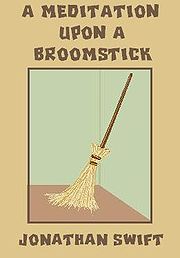
Meditation Upon a Broomstick
Encyclopedia

Satire
Satire is primarily a literary genre or form, although in practice it can also be found in the graphic and performing arts. In satire, vices, follies, abuses, and shortcomings are held up to ridicule, ideally with the intent of shaming individuals, and society itself, into improvement...
and parody
Parody
A parody , in current usage, is an imitative work created to mock, comment on, or trivialise an original work, its subject, author, style, or some other target, by means of humorous, satiric or ironic imitation...
written by Jonathan Swift
Jonathan Swift
Jonathan Swift was an Irish satirist, essayist, political pamphleteer , poet and cleric who became Dean of St...
in 1701. Edmund Curll
Edmund Curll
Edmund Curll was an English bookseller and publisher. His name has become synonymous, through the attacks on him by Alexander Pope, with unscrupulous publication and publicity. Curll rose from poverty to wealth through his publishing, and he did this by approaching book printing in a mercenary...
, in an attempt to antagonize and siphon off money from Swift, published it in 1710 from a manuscript stolen from Swift (which forced Swift to publish a corrected and authorized version that he also had to write from memory), but the satire's origins lie in Swift's time at Moor Park, Surrey, when he acted as Secretary to William Temple. While in the household, Swift would read passages from Robert Boyle
Robert Boyle
Robert Boyle FRS was a 17th century natural philosopher, chemist, physicist, and inventor, also noted for his writings in theology. He has been variously described as English, Irish, or Anglo-Irish, his father having come to Ireland from England during the time of the English plantations of...
's Occasional Reflections upon Several Subjects (1665) for the young Esther Johnson
Esther Johnson
Esther Johnson was the English friend of Jonathan Swift, known as "Stella".Newfoundland-born author Trudy J. Morgan-Cole wrote a novel in 2006 detailing fictionalized portions of the Swift/Johnson friendship in The Violent Friendship of Esther Johnson...
("Stella" to Swift).
Boyle's Reflections took the form of meditations on everyday subjects, where they were likened to religious themes. Boyle would consider a fire, or house cleaning, and see in it a reflection of God's relationship to man, or man to his soul. These reflections were very popular in the Temple household. One day, Swift, being bored with the predictability of Boyle's points, wrote his own Meditation and put it into the book. When the time came to read for the day, he read, instead of Boyle, his own Meditation Upon a Broomstick. The ladies of the house did not catch on until near the end of the meditation that it was absurd. Swift later wrote up the Meditation in a more formal manner and published it to counteract Curll's piracy.
To get a flavor for the Meditation, consider the last paragraph:
- "But a Broom-stick, perhaps you'll say, is an Emblem of a Tree standing on its Head; and pray what is Man, but a Topsy-turvy Creature, his Animal Faculties perpetually mounted on his Rational; His Head where his Heels should be; groveling on the Earth, and yet with all his Faults, he sets up to be a universal Reformer and Corrector of Abuses, a Remover of Grievances, rakes into every Slut's Corner of Nature, bringing hidden Corruptions to the Light, and raises a mighty Dust where there was none before, sharing deeply all the while, in the very same Pollutions he pretends to sweep away: His last Days are spent in Slavery to Women, and generally the least deserving; 'till worn to the Stumps, like his Brother Bezom, he's either kicked out of Doors, or made use of to kindle Flames, for others to warm Themselves by."
The Meditation begins with a rational moral comparison and proceeds to a frenzy of increasingly unlikely comparisons. While the satire begins with a pitch-perfect imitation of the kindly Boyle's tone, it ends in a frantic, misanthropistic and misognynistic note of despair and nihilism. Also, while it begins with a hopeful call to self-examination, it moves eventually into a condemnation of all efforts at improvement.

